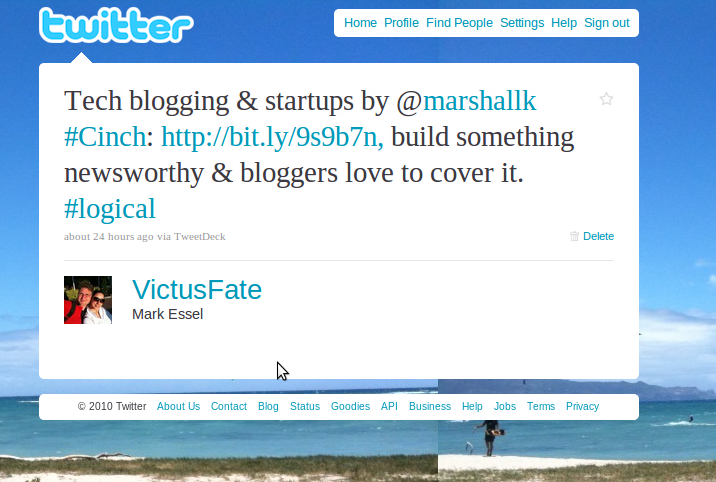
the cinch cast is linked through the image
Credit for inspiring this riff goes to Marshall Kirkpatrick for his brief cinchcast covering the relationship of Tech Bloggers and Startup Founders. I'm both of these, and really enjoyed his take on a symbiotic relationship that can often feel unbalanced.
Blogger's Perspective
There's a risk that your blog coverage will be a flop if your readers aren't interested in yet another weak product. It's gotta sizzle. It's gotta sing. With every story covered, tech bloggers risk their reputation and future growth. The breakout of going mainstream is always just a few massive scoops away. The tech blogger's quest for fame and glory is not unlike the struggling startup's desperate search for traction.
What Marshall revealed is that tech journals don't get many page views out of covering the majority of startups. That's right, those posts just sink like stones. The splash of a new company going live is akin to a pebble falling in the ocean, no one notices or cares. Startup launches are unfortunately just filler in the juicier melodramas of the tech blogosphere. And even worse, there's better filler. BigCo feature updates have a much bigger page view payoff now*.
But covering a (struggling) startup feels good. It captures all the essence of rooting for the underdog and more than that, it's a great relationship builder as that company grows. The hope in startup coverage is that this one will survive, and you'll have broken the story and covered it at the outset before it becomes a legend.
Tech bloggers also carefully watch the communications of investors. Both angel and venture capitalists love to share major events of their portfolio companies. Louis Gray read the tea leaves not long ago in hopes of uncovering a scoop on Foursquare acquiring Brizzly. Mike Hirshland's tweet about a buyout offer, and Brizzly's legal consulting and visit to Foursquare HQ in New York were a potentially very hot trail. Unfortunately there was only smoke in this story and Louis explained the guesswork that lead him astray.
Founder's Perspective
Whatever you're working on, building, or planning is fantastic and you want everyone to know immediately. But small startups aren't ready for big coverage before their products are carefully refined and spit polished. As a founder I want a real time information jack plugged into the imagination of the world, where I can modify my design decisions in real time to best fit changing needs of population segments. Popular tech bloggers are the closest thing I've got to that. I can read their coverage, and more importantly the response and comments of fellow fans. As much as I want coverage, I realize we don't have a product that demands the public's attention yet. There's more work to do, and the best way to earn the attention of potential users and customers is by building something they'll share with their friends. Popular tech bloggers can only fan the flames of an already breakout new startup.
I recognize media as a tool of gathering early finance though. Without the New York Times coverage, I seriously doubt whether Diaspora would have scored $200k of free money from Kickstarter^. A dash of media coverage can be a signal that captures investor's attention as well as the public eye. But what does it take to make a news worthy startup and product, and are these the same business choices that will best serve potential users and customers later on?
Notes:
*= Did the iOS 4 just get jailbroken? Pageviews!
^ = the Diaspora team still has to deliver a lot of T-shirts and CDs, and provide service for installations of their code (if it's usable which it looks like it will be)